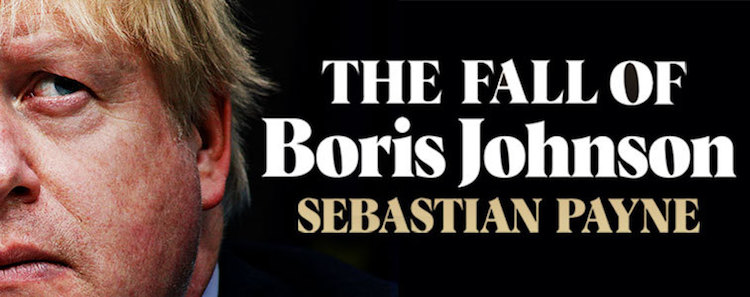
In The Fall of Boris Johnson: The Full Story, Sebastian Payne gives a comprehensive insider’s account of the final months of Boris Johnson’s premiership, which he describes as “the most remarkable political defenestration in modern British political history.” Until recently, Payne was the Whitehall editor of the Financial Times and the host of the Payne’s Politics podcast; he interviewed Johnson for his first book, Broken Heartlands.
Payne concludes that there were “three Ps that brought down the prime minister — Paterson, partygate and Pincher”. He sees Johnson’s downfall as an inevitable result of the former PM’s belief that the rules don’t apply to him: “it was always going to come to a premature and sticky end... Johnson resists the idea that he has to bother with the consequences for his actions that normal people have to contend with.” (The ‘three Ps’ theory was first mentioned last August, on the BBC podcast Boris.)
After Conservative MP Owen Paterson was accused of lobbying, Johnson authorised a scheme to rewrite the disciplinary process, a blatant “Tory ruse to save one of their own” that united both government and opposition MPs against it. The ‘partygate’ and Chris Pincher scandals were more personally damaging to Johnson, as in both cases he was, in Alan Clark’s famous phrase, “economical with the actualité.” He falsely claimed in parliament that no parties had taken place at Downing Street during the coronavirus lockdown, and he falsely denied any prior knowledge of MP Chris Pincher’s reputation for sexual harassment.
Payne concludes that there were “three Ps that brought down the prime minister — Paterson, partygate and Pincher”. He sees Johnson’s downfall as an inevitable result of the former PM’s belief that the rules don’t apply to him: “it was always going to come to a premature and sticky end... Johnson resists the idea that he has to bother with the consequences for his actions that normal people have to contend with.” (The ‘three Ps’ theory was first mentioned last August, on the BBC podcast Boris.)
After Conservative MP Owen Paterson was accused of lobbying, Johnson authorised a scheme to rewrite the disciplinary process, a blatant “Tory ruse to save one of their own” that united both government and opposition MPs against it. The ‘partygate’ and Chris Pincher scandals were more personally damaging to Johnson, as in both cases he was, in Alan Clark’s famous phrase, “economical with the actualité.” He falsely claimed in parliament that no parties had taken place at Downing Street during the coronavirus lockdown, and he falsely denied any prior knowledge of MP Chris Pincher’s reputation for sexual harassment.

The heart of the book is an epic forty-page account of Johnson’s last two days in office. This detailed coverage of ‘the bunker’ expands on a similar report by Tim Shipman in The Sunday Times (from 10th July 2021) and a long read by Payne himself (headlined “Boris Johnson’s last stand”) in FT Weekend on 19th November last year. Payne and Shipman both quote Johnson’s arch response after Michael Gove asked if he would resign: “No, Mikey, mate, I’m afraid you are.” Payne also recounts Johnson telling Gove: “they’re going to have to prise me out of here.” Gove and Johnson’s relationship was one of the most fascinating in modern British politics, and Johnson is, as Payne puts it, “the most compelling political campaigner of his generation”.

